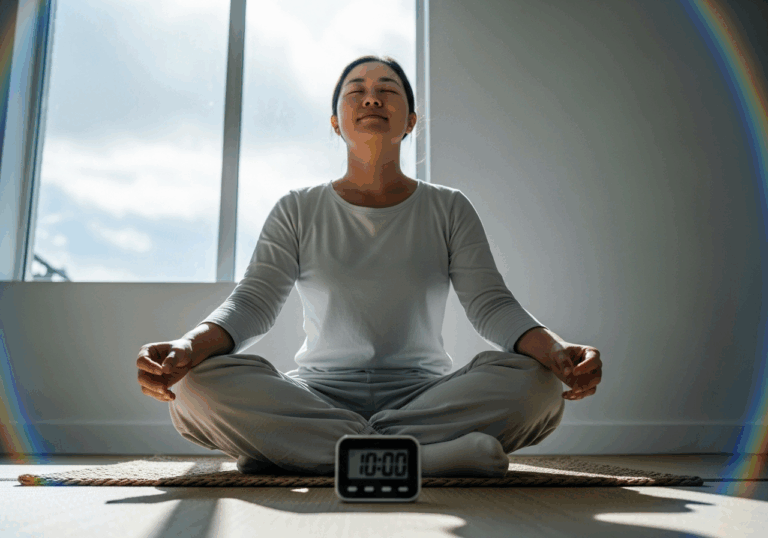Science-Backed Tips
Reduce Nurse Anxiety with Defusion Training
Moderate anxiety reduction of 1.22 SMD through cognitive defusion.
📊 Did you know?
💡 Why It Matters
1️⃣
Implementing defusion training can lead to a significant decrease in anxiety symptoms among nurses, promoting better mental health.
2️⃣
Improved psychological flexibility can enhance overall job performance and satisfaction in high-stress healthcare environments.
3️⃣
Remote training methods provide accessible mental health support, crucial for nurses facing increasing workplace pressures.
✅ Try These Micro-Tips
🎯
Engage in 20-minute cognitive defusion exercises daily to reduce anxiety.
🎯
Participate in weekly online ACT sessions to enhance emotional resilience.
🎯
Practice mindfulness techniques for at least 10 minutes each day.
🎯
Reflect on personal thoughts and feelings through journaling once a week.
📚 The study
This research is particularly important as it underscores the potential of remote training methods to provide accessible mental health support for nurses, who often face overwhelming workplace pressures. By implementing defusion training, healthcare professionals can experience a substantial decrease in anxiety symptoms, leading to enhanced emotional resilience and overall job satisfaction. This is crucial in high-stress environments where mental well-being directly influences job performance.
The findings advocate for the integration of such remote training programs in healthcare settings, ensuring that nurses have the tools they need to manage their mental health effectively. As the demand for mental health support grows, this study paves the way for innovative solutions that can transform the well-being of healthcare workers everywhere.
❓ Frequently Asked Questions ❓
Learn more
What is defusion training?
Defusion training is a technique used in Acceptance and Commitment Therapy (ACT) that helps individuals detach from their thoughts and reduce their impact on emotions. It aims to enhance psychological flexibility and emotional resilience, particularly in high-stress environments like healthcare.
How does defusion training help reduce anxiety in nurses?
Defusion training helps nurses by decreasing thought entanglement, which can lead to a significant reduction in anxiety symptoms. In a study, nurses who participated in a web-based ACT course experienced a moderate reduction in anxiety levels.
What were the results of the study on defusion training for nurses?
The study found that defusion training led to a moderate reduction in anxiety symptoms, with a standardized mean difference (SMD) of approximately -1.22. Additionally, psychological flexibility improved among participants at follow-up.
How long was the defusion training program for nurses?
The defusion training program was conducted over a period of five weeks. It included both mobile and web-based components to facilitate learning.
What methods were used to assess the effectiveness of the training?
Pre- and post-assessments were conducted to evaluate the effectiveness of the defusion training. These assessments measured changes in anxiety symptoms and psychological flexibility among the nurses.
Why is psychological flexibility important for nurses?
Psychological flexibility allows nurses to adapt to changing circumstances and manage stress more effectively. Improved flexibility can lead to enhanced job performance and overall job satisfaction in high-pressure healthcare settings.
What are some recommended practices to enhance emotional resilience?
Engaging in 20-minute cognitive defusion exercises daily and participating in weekly online ACT sessions are effective practices. Additionally, practicing mindfulness for at least 10 minutes each day can further enhance emotional resilience.
How can journaling contribute to mental health for nurses?
Journaling allows nurses to reflect on their personal thoughts and feelings, which can help in processing emotions and reducing anxiety. It is recommended to journal once a week for optimal benefits.
What is the significance of remote training methods for nurses?
Remote training methods provide accessible mental health support, which is crucial for nurses facing increasing workplace pressures. This flexibility allows nurses to engage in training without the constraints of traditional in-person sessions.
What is the overall impact of defusion training on nurses’ mental health?
Defusion training has been shown to significantly decrease anxiety symptoms among nurses, promoting better mental health. By enhancing emotional resilience, it contributes to a healthier work environment in the healthcare sector.





